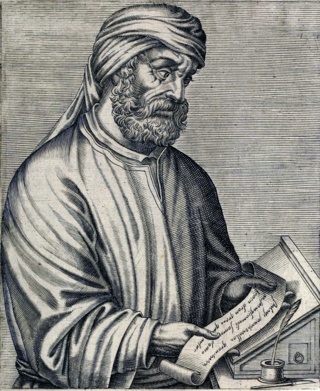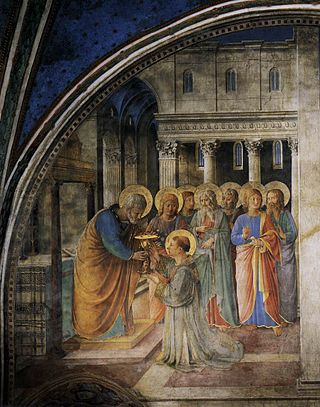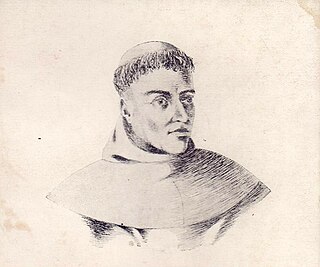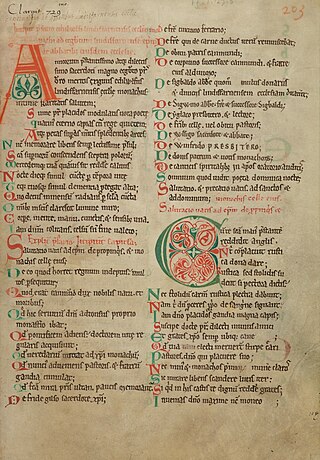There have been many works attributed to Tertullian in the past which have since been determined to be almost definitely written by others. Nonetheless, since their actual authors remain uncertain, they continue to be published together in collections of Tertullian's works. The unknown authors of these works are usually called Pseudo-Tertullian by scholars. Such works include

Polycarp was a Christian bishop of Smyrna. According to the Martyrdom of Polycarp, he died a martyr, bound and burned at the stake, then stabbed when the fire failed to consume his body. Polycarp is regarded as a saint and Church Father in the Eastern Orthodox Church, the Roman Catholic Church, Oriental Orthodox Churches, Lutheranism, and Anglicanism.

Tertullian was a prolific early Christian author from Carthage in the Roman province of Africa. He was the first Christian author to produce an extensive corpus of Latin Christian literature and was an early Christian apologist and a polemicist against heresy, including contemporary Christian Gnosticism.

Pope Soter was the bishop of Rome from c. 167 to his death in c. 174. According to the Annuario Pontificio, the dates may have ranged from 162–168 to 170–177. He was born in Fundi, today in Campania, in the Lazio region of Italy. Soter is known for declaring that marriage was valid only as a sacrament blessed by a priest and also for formally inaugurating Easter as an annual festival in Rome. His name, from Greek Σωτήριος from σωτήρ "saviour", would be his baptismal name, as his lifetime predates the tradition of adopting papal names.
Marcionism was an early Christian dualistic belief system that originated with the teachings of Marcion of Sinope in Rome around 144 AD. Marcion was an early Christian theologian, evangelist, and an important figure in early Christianity. He was the son of a bishop of Sinope in Pontus. About the middle of the 2nd century (140–155) he traveled to Rome, where he joined the Syrian Gnostic Cerdo.
Cerinthus was an early Gnostic, who was prominent as a heresiarch in the view of the early Church Fathers. Contrary to the Church Fathers, he used the Gospel of Cerinthus, and denied that the Supreme God made the physical world. In Cerinthus' interpretation, the Christ descended upon Jesus at baptism and guided him in ministry and the performing of miracles, but left him at the crucifixion. Similarly to the Ebionites, he maintained that Jesus was not born of a virgin, but was a mere man, the biological son of Mary and Joseph.
An apostolic see is an episcopal see whose foundation is attributed to one or more of the apostles of Jesus or to one of their close associates. In Catholicism, the phrase "The Apostolic See" when capitalized refers specifically to the See of Rome.
Valentinus was the best known and, for a time, most successful early Christian Gnostic theologian. He founded his school in Rome. According to Tertullian, Valentinus was a candidate for bishop but started his own group when another was chosen.
Gennadius of Massilia, also known as Gennadius Scholasticus or Gennadius Massiliensis, was a 5th-century Christian priest, monk, and historian.
Adversus Haereses is the commonly used Latin title for a book by the Church Father Irenaeus, Bishop of Lyon in Gaul. It is also often cited as Against Heresies or On the Detection and Overthrow of the So-Called Gnosis. It is a five-volume work against Gnosticism and other Christian heresies, written around 180 CE.
Apelles was a second-century Gnostic Christian thinker. He began his ministry as a disciple of Marcion of Sinope, likely in Rome. However, at some point, Apelles either left or was expelled from the Marcionite church.

Philastrius Bishop of Brescia, was one of the bishops present at a synod held in Aquileia in 381.
Praxeas was a Monarchian from Asia Minor who lived in the end of the 2nd century/beginning of the 3rd century. He believed in the unity of the Godhead and vehemently disagreed with any attempt at division of the personalities or personages of the Father, Son, and Holy Spirit in the Christian Church. He was opposed by Tertullian in his tract Against Praxeas, and was influential in preventing the Roman Church from granting recognition to the New Prophecy.
In early Christian heresiology, the Panarion, to which 16th-century Latin translations gave the name Adversus Haereses, is the most important of the works of Epiphanius of Salamis. It was written in Koine Greek beginning in 374 or 375, and issued about three years later, as a treatise on heresies, with its title referring to the text as a "stock of remedies to offset the poisons of heresy." It treats 80 religious sects, either organized groups or philosophies, from the time of Adam to the latter part of the fourth century, detailing their histories, and rebutting their beliefs. The Panarion is an important source of information on the Jewish–Christian gospels, the Gospel of the Ebionites, and the Gospel of the Hebrews.

The Seven, often known as the Seven Deacons, were leaders elected by the early Christian church to minister to the community of believers in Jerusalem, to enable the Apostles to concentrate on 'prayer and the Ministry of the Word' and to address a concern raised by Greek-speaking believers about their widows being overlooked in the daily diakonia or ministry.

Against Heresies, sometimes referred to by its Latin title Adversus Haereses, is a work of Christian theology written in Greek about the year 180 by Irenaeus, the bishop of Lugdunum.

Alfonso de Castro, O.F.M., known also as Alphonsus à Castro, was a Franciscan theologian and jurist. He belongs to the group of theologian-jurists known as the School of Salamanca, though he denied belonging to a specific school of thought and condemned many theologians who did. He was most well-known in the sixteenth century for his work Adversus omnes haereses, libri XIV, an encyclopedic treatise on ancient and modern heresies.

De abbatibus is a Latin poem in eight hundred and nineteen hexameters by the ninth-century English monk Æthelwulf (Ædiluulf), a name meaning "noble wolf", which the author sometimes Latinises as Lupus Clarus. It recounts the history of his monastery from its foundation through its six first abbots and ending with Æthelwulf's two visions. It is addressed to the Bishop of Lindisfarne, Ecgberht, and dates to between 803 and 821.
Cyprianus Gallus or Cyprian the Gaul is the conventional name of the poet who wrote a Late Latin epic versification of the historical books of the Old Testament based on the Old Latin translation, although only his version of the Heptateuch (Heptateuchos) has survived to the present day. He has sometimes been credited with the authorship of two other poems, Carmen de Sodoma and Carmen de Iona, but neither fits his style and language. These have also been attributed to Cyprian of Carthage and Tertullian.

Pseudo-Cyprian is the conventional designation for the anonymous authors of Latin works falsely attributed to Cyprian of Carthage. These works do not have a common transmission history. Most are not forgeries, but were texts mistakenly attributed to Cyprian from an early date in their transmission. In many cases the works were taken to be authentic until modern times.
Ebion was the presumed eponymous founder of an early Christian group known as the Ebionites. The existent historical evidence indicates that the name "Ebionite" is derived from a Hebrew word, "ebion" (אביון) meaning "poor" and thus not from someone's name. Ebion is generally seen today as a purely literary figure, whose reputed existence in antiquity was used to explain where the Ebionites got their inspiration. However, once he had been accepted as real, a small tradition developed around him that lasted in early learned Christian circles for a few centuries.